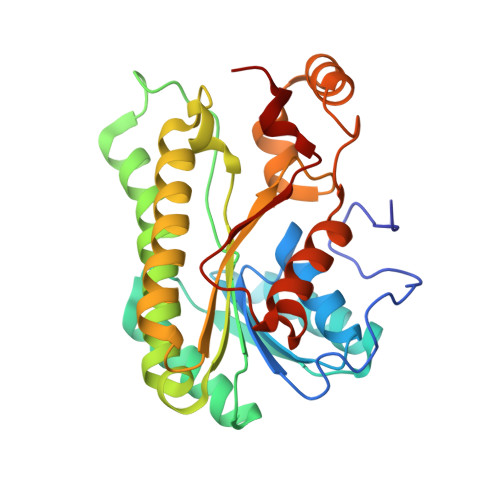Studies of human 2,4-dienoyl CoA reductase shed new light on peroxisomal beta-oxidation of unsaturated fatty acids
Hua, T., Wu, D., Ding, W., Wang, J., Shaw, N., Liu, Z.J.(2012) J Biol Chem 287: 28956-28965
- PubMed: 22745130
- DOI: https://doi.org/10.1074/jbc.M112.385351
- Primary Citation of Related Structures:
4FC6, 4FC7 - PubMed Abstract:
Peroxisomes play an essential role in maintaining fatty acid homeostasis. Although mitochondria are also known to participate in the catabolism of fatty acids via β-oxidation, differences exist between the peroxisomal and mitochondrial β-oxidation. Only peroxisomes, but not mitochondrion, can shorten very long chain fatty acids. Here, we describe the crystal structure of a ternary complex of peroxisomal 2,4-dienoyl CoA reductases (pDCR) with hexadienoyl CoA and NADP, as a prototype for comparison with the mitochondrial 2,4-dienoyl CoA reductase (mDCR) to shed light on the differences between the enzymes from the two organelles at the molecular level. Unexpectedly, the structure of pDCR refined to 1.84 Å resolution reveals the absence of the tyrosine-serine pair seen in the active site of mDCR, which together with a lysine and an asparagine have been deemed a hallmark of the SDR family of enzymes. Instead, aspartate hydrogen-bonded to the Cα hydroxyl via a water molecule seems to perturb the water molecule for protonation of the substrate. Our studies provide the first structural evidence for participation of water in the DCR-catalyzed reactions. Biochemical studies and structural analysis suggest that pDCRs can catalyze the shortening of six-carbon-long substrates in vitro. However, the K(m) values of pDCR for short chain acyl CoAs are at least 6-fold higher than those for substrates with 10 or more aliphatic carbons. Unlike mDCR, hinge movements permit pDCR to process very long chain polyunsaturated fatty acids.
Organizational Affiliation:
National Laboratory of Biomacromolecules, Institute of Biophysics, Chinese Academy of Sciences, Beijing 100101, China.
















